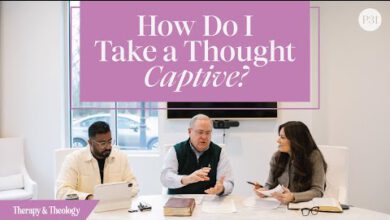I Don’t Understand What God Is Allowing | Therapy & Theology with Lysa TerKeurst
I Don’t Understand What God Is Allowing | Therapy & Theology with Lysa TerKeurst
Yes, it’s perfectly fine to confess. Confession time is an opportunity to reflect and heal. In our previous episode, we discussed betrayal, focusing on the final layer of this painful experience. We explored six layers of betrayal, with the last one being the challenging question: Why didn’t God stop this? Sometimes, the deepest form of betrayal comes from misunderstanding what God allows in our lives.
While I trust God to provide stability, true faith in Him means trusting even when things don’t make sense or when God doesn’t act in the way I expect. I have to trust that God is trustworthy, even when I don’t fully understand why He allows certain things to happen.
Recently, I wrote a question in my journal that continues to challenge me every day: How would my life look different if I truly believed in the goodness and trustworthiness of God? This question has had a profound impact on how I view my life, relationships, and the amount of hope I have.
One of the effects of experiencing broken trust in human relationships is that I quietly began to lose hope. It’s fascinating how trust and hope are so closely connected. Trust broken in significant relationships often leads to a diminished sense of hope.
In Luke 24, we see a passage that deeply resonates with this concept. It highlights the feeling of betrayal when we believe God has let us down. The people of Israel, who had placed all their hopes in Jesus as the promised Messiah, felt let down when He didn’t fulfill their expectations of immediate deliverance from Roman oppression. Luke 24:21 says, “We were hoping that He was the one who was going to redeem Israel.”
Here’s an interesting thought: we could replace the word “hope” with “trust.” The Bible teaches us that whatever we place our hope in must have substance. If we trust something that lacks substance, we’ll ultimately feel hopeless and experience broken trust.
Another important point is how we sometimes test God’s trustworthiness based on whether He provides immediate relief for our greatest concerns. The people in Luke 24 wanted immediate relief from Roman oppression, but when Jesus didn’t provide it, they began to question His trustworthiness.
This raises an important lesson: often, when we say we trust someone, that trust comes with conditions. We say, “I trust, but only if…” This conditional trust is what leads to feelings of betrayal when things don’t unfold as we expect.
Ultimately, understanding that God’s plans may not always align with our immediate desires doesn’t mean He’s untrustworthy. Rather, it’s about learning to trust God despite our conditions. This is the deeper trust that faith calls us to.
This version is streamlined, clear, and optimized for SEO by using relevant keywords like “trust,” “hope,” “God,” and “betrayal,” while maintaining a natural flow that is easy for readers to understand and engage with.
